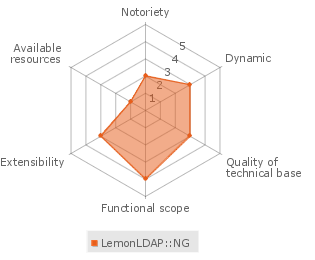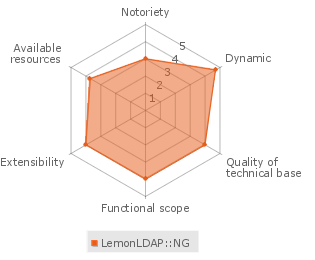

LemonLDAP::NG

| 2.7 | 3.9 | |
| Smile | Visitors | Global |
LemonLDAP::NG is a Web SSO authentication system initiated in 2004 by the company Linagora, and now taken over by the OW2 Consortium. It requires the use of an Apache server, although its reverse proxy mode allows it to be used with applications running on a different server (IIS, Tomcat, etc.).
LemonLDAP::NG makes it possible to base web application authentication on a LDAP directory, but also on many other directories, databases and other systems such as OpenID and SAML. It can also serve as a CAS, OpenID and SAML supplier. Access control can be defined by URL for each application in need of protection, and LemonLDAP::NG provides for access traceability. A web admin interface is also available.
The product is developed in Perl and is easy to personalise, in terms of both its behaviour and its appearance, via a template engine.
LemonLDAP::NG is distributed under the GPL.
Assessments
| Smile | Visitors (3 Opinion) |
|---|---|

|

|
Smile rating
2.7 5Users opinions See all opinions (3)

Rate this solution the 21/09/2013
“ Très simple d'installation, configuration en mode texte ou graphique, compatible avec des nombreuses applications web ”
18 persons have the same opinion
Rate this solution the 12/09/2013
“ Une bonne solution pour s'interfacer notamment avec un Active Directory. ”
13 persons have the same opinionInformations 
| Ohloh users rating | 4.67 (6 votes) |
|---|---|
| lines of code | 280420 lines |
|
Contributors (for the 12 last months) |
4 |
| Programming Languages | XML, Perl, JavaScript, 8 Other |
| Tags | identity single_sign_on lasso authorization mod_perl2 alliance kerberos apache saml twitter security singlesignon authentication openid20 apache2 web web-sso ldap authentification sso websso openid cas central_authentication_service http mod_perl saml2 perl saml-20 saml20 webservices liberty |
| Download url | http://lemonldap-ng.org/download |
| Ohloh page | https://www.openhub.net/p/lemonldap-ng |
Latest news for the solution
- 07/02/2014 // LemonLDAP::NG 1.3.2: Discover the improvements
You would like to give an opinion? Please grade the solution on the below criteria and leave an evaluation comment in the text box.
Step 1 : Rating and details



Rate this solution the 23/05/2016
“ Seule solution de gestion des identités à la fois véritablement libre (aucune ressource non disponible librement) et adaptée au monde des entreprises (gestion centralisée des autorisations, interopérabilité avec tous les protocoles d'échange d'identité tels OpenID-Connect, SAML,…). ”
8 persons have the same opinion